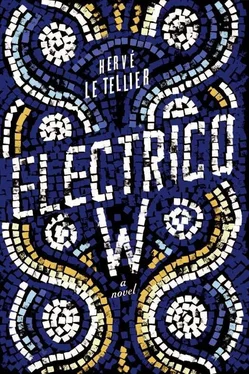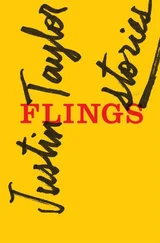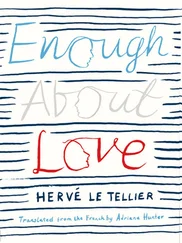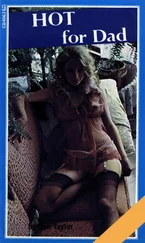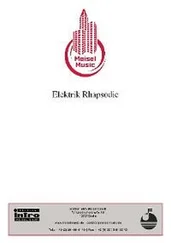I knew of another one, published around the same time. A simple grenade explosion near a bridge in Frankfurt. The picture was taken from very close quarters, it’s a miracle he didn’t leave his life there. It looks like a firework, for the Fourth of July. Except for an American soldier frozen in a peculiar, aerial motion, he was obviously already dead.
But there was one he had never wanted to have published. He always had a copy of it on him, protected with transparent adhesive film. On the back he had written: “Munich, June 6, 1945.” It was of a man of indeterminate age, wearing rags, his face appallingly thin, his eyes so sunken they could almost have been plucked out. He had no laces left in his shoes and he sat slumped amid the ruins. Before him, the dull gleam of a tiny piece of metal.
Perhaps he was a Jew who had survived one of the Polish death camps that the Soviets had liberated in January. Oświęcim. Later people said Auschwitz. Although Harry had not actually seen a single camp. Or only glimpses from a few photos published here and there in the papers, starting in April 1945 when the British entered Bergen-Belsen. The images were unbearable and yet Bergen-Belsen wasn’t actually an extermination camp, hardly even one for the sick. Harry had cut them out, those photos, and — to keep his loathing for the Germans alive — he sometimes looked at the faces of those dazed, emaciated, spent clowns in their striped suits. That day in Munich was the first time he saw a deportee close up.
The man had mimed bringing food up to his twisted mouth, and had reached his hand out toward Harry. Then, when Harry didn’t move, he clutched hold of him with his feeble skeletal fingers. He was filthy, covered in fleas and ringworm marks, stinking of putrefaction and piss. Harry looked away and pushed him off. To get rid of him, he rummaged through his pockets and threw him a dime. At the time, that wasn’t too bad. The man reached clumsily for the coin but didn’t manage to catch it. It rolled over the rubble. He ran to pick it up, but as he bent over he collapsed like an empty sack. Exhausted by the effort, he stayed there, gasping among the ruins. The coin gleamed a few centimeters from his hand, but he didn’t have the strength left.
Harry had shuddered. It was not yet shame, just disgust. With himself, with the war, with that eye-popping stare fixed on the brass coin. Harry discovered he was capable of barbarity. He had crossed the invisible boundary that separates indifference from cruelty. A monster within him woke and proved stronger than the human being. It was getting dark. Harry walked away, not daring to look at the man who was still on the ground.
And yet, although he couldn’t have said why, at the last minute he took the photo. The man, the coin, the ruins. The empty eyes.
An hour later, in the kitchen of a house requisitioned by his regiment, one of the few houses still standing in Munich, he developed the film and immediately made a set of prints. The picture came out in crisp focus, the framing was impeccable, it was the best of the roll. It was taken from just above the man, making him look truly alone, for all eternity, destitute. Only his hands were slightly out of focus, but that was probably because they had been shaking.
Harry put the picture down. He crouched on the ground and started shivering, and then whimpered like a wounded dog. Then he started punching the tiled floor, until blood oozed from his fingers.
Harry spent that night scouring the city, not really sure what he would do if he managed to find the man. By dawn he had interviewed dozens of people, old women, children, but in a bomb-ravaged Munich no one paid much attention to anyone else anymore. He sometimes said it was for the best, that his shame was now the truest part of him, that it had changed him permanently for the better.
Perhaps he was lying. Perhaps he was no better than before.
I put the newspaper down and turned out the light. I too had been a war correspondent for a while. The draw of the big wide world, the myth surrounding journalists, those words by the poet Supervielle about a pineapple-scented sadness worth more than a happiness that had never known travel. I too wanted to see the sun from another angle. One evening in 1981 when I was on the Mosquito Coast in the Sandinistas’ Nicaragua, a.22 caliber bullet fired from a contra’s M16 embedded itself in a beam less than two feet from my temple. It made the clean, powerful sound of an ax against a tree, and that pellet of steel gleamed in the half light. I flew back to Paris shortly after that and told the paper I was quitting, I was frightened; no one criticized me for it.
I was about to fall asleep when the telephone started ringing in Antonio’s room, ringing and ringing. At first I thought he wasn’t in there, that he had gone out in the night. But the ringing stopped and I heard his voice through the closed doors.
It was calmer than usual, very soft, and I guessed he was talking to a woman. It must have been a call from Paris, I only caught snatches of the conversation but it was in French. Sometimes his voice was a murmur like the whisper of a freshwater spring. I knew it was the woman he had mentioned, that she was unhappy, that he wouldn’t find the words to comfort her.
So as not to listen, I concentrated on the Contos aquosos that I always kept close at hand. My copy was in good condition even though it was old, dated 1973. The cover was dog-eared, that was all.
Montestrela was obsessed with the passage of time, with old age, degeneration, and death. Half of the short stories tackled this theme, and not always with any distance, or even levity. Sometimes he also descended rather distressingly into pornography, even into scatological vulgarities not worthy of the lyrical poet who had once written the poignant Prisão , which Marguerite Yourcenar had praised for the “painful, almost martyred rhythm of its syllables.” Still, I did not allow myself to censure anything, including stories such as this:
On the island of Pergos, under the reign of Toludey I, the law forbade anyone from taking anything without giving something at the same time. So the inhabitants drank only when they passed urine, and ate only when they defecated. Under these conditions, it was difficult to appreciate the aroma of the dishes during banquets, and culinary art in Pergos deteriorated until the Persian invasion in the third century B.C., an invasion that brought a salutary end to Toludeyan law.
At one point, I heard Antonio in his room almost shouting: “Don’t cry, please, I beg you, don’t cry …” There was the sharp clunk of him hanging up and almost immediately the sound of the telephone ringing again. This time Antonio picked up right away.
I switched on the bedside light and started scribbling the notes that helped me write this passage later. After a few minutes I heard footsteps in the lounge, the sound of a window being opened, and two very quiet knocks on my door.
I got out of bed and opened the door, Tonio was standing there holding two glasses. The lounge looked subtly alive in the half light, as if inhabited by the breeze and thrum of the city.
“Sorry to disturb you, I saw the light under the door. Did the phone wake you?”
I shook my head, but Tonio didn’t wait for an answer and handed me a glass of beer.
“Here,” he said. “I opened a couple of Sagres from the minibar. Nothing like a cold beer in the middle of the night …”
I smiled, reached my glass toward his, and he clinked them together with a shy, cautious expression that was probably appropriate for a new friendship. In the darkness his features looked unfamiliar, he looked handsomer, but older too, with more wrinkles and a more receding hairline. He could have been my brother.
Читать дальше
